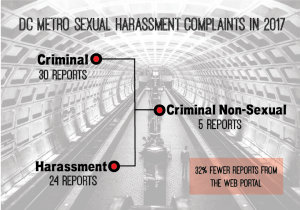
For Sexual Assault Awareness Month, Washington Metropolitan Area Transit Authority has paired up with local advocacy groups to spread awareness and combat harassment and sexual assault. This year, Metro has seen a drop in reports of sexual harassment through its survey and web portal.
For Sexual Assault Awareness Month, Washington Metropolitan Area Transit Authority police officers hosted outreach events at five Metrorail stations Tuesday to raise awareness about sexual harassment on the Metro.
In collaboration with Collective Action for Safe Spaces, which is a D.C.-based organization focused on ending public harassment and sexual assault in the area, and Stop Street Harassment, officers spoke to commuters at the Gallery Place, Shaw-Howard, L’Enfant Plaza, Rosslyn and Silver Spring train stations during evening rush hour to encourage riders to report incidents of sexual harassment.
Reports can be made via WMATA’s text message system, hotline number and web portal, as well as reporting directly to an employee or sending an email.
These efforts follow the launch of WMATA’s anti-sexual harassment public service campaign last fall, which encourages victims and witnesses to speak up. According to WMATA, this day of spreading awareness is part of a multi-level campaign that began in 2012 to combat sexual harassment on Metro services.
A January 2016 WMATA online survey reported that 21 percent of transit riders in the D.C. region have experienced sexual harassment on public transportation. Following those results, WMATA has worked to improve employee training and raise public awareness on the issue through anti-sexual harassment advertisements.
According to the survey, verbal harassment was the most common at 75 percent, with women nearly three times more likely to experience it than men. Twenty-six percent of responders said they had been touched in a sexual way and 2 percent had experienced sexual assault.
Metro Transit Police Chief Ron Pavlik said despite Metro reporting a 32 percent decline in reports of harassment last year, those experiencing harassment should be discouraged from reporting incidents to police.
“Everyone deserves to be treated with respect and have the right to travel without being harassed or intimidated,” Pavlik wrote in an April 4 press release. “We encourage anyone who feels they have been the victim of harassment to report it regardless of whether you believe it rises to the level of a crime.”
Rosslyn Metro employee T. Richardson said occurrences of sexual harassment have decreased dramatically, based on her experience.
“There are memos sent out by WMATA about having a safe work environment; that’s always reiterated from our officials to us. There’s nothing on those lines [sexual harassment] that I’m aware of that happens,” Richardson said.
CASS Executive Director Jessica Raven wrote in an April 4 press release that other organizations can learn from WMATA’s work with CASS and Stop Street Harassment to prevent sexual harassment.
“WMATA has been a leader in training staff and raising public awareness about sexual and gender-based harassment, and WMATA’s anti-harassment campaign, in partnership with CASS and Stop Street Harassment, is a model for others to replicate,” Raven wrote.
Tuesday’s outreach marked the first time WMATA collaborated with Stop Street Harassment as part of the organization’s International Anti-Street Harassment Week. Since 2012, CASS has collaborated with WMATA to create public awareness, collect data and train transit employees and police.
Organizations from 43 countries are honoring International Anti-Street Harassment Week this year, which seeks to draw awareness to and end gender-based street harassment.
Author and gender-based violence expert Holly Kearl established Anti-Street Harassment Week in 2012 after overwhelming support convinced her to extend the awareness from her original one-day campaign in 2011.
Kearl said her organization’s collaboration with WMATA stemmed from her desire to raise awareness and educate people on the options they have for reporting incidents of harassment. The outreach group stationed themselves at Metro elevators to hand out leaflets and wristbands to commuters.
“People were really supportive and appreciative, so that was a positive thing. And some of the people were like, ‘Oh I didn’t even know there was a campaign, I didn’t know I could report this, thank you for letting me know,’” Kearl said. “That’s what we’re trying to do — just let people know that there is a campaign against harassment on the metro, and there are several ways to report it.”
Kearl, who received a master’s degree from The George Washington University, said she was motivated by her own experiences of sexual harassment in the D.C. area to write her master’s thesis on the subject.
“I started Stop Street Harassment a year after I finished my thesis. There’s no funding; I just volunteer my time, as do other people who help me,” Kearl said. “So, it’s grass-roots and I use Twitter and email all the time to promote the week and connect with people.”
The organization has expanded organically, with Kearl reaching out and raising awareness with supporters through social media. Georgetown has collaborated with Kearl before to spread awareness about sexual assault. The university and Kearl hosted political analyst and feminist Zerlina Maxwell in 2015 to discuss rape culture and sexual harassment. Stop Street Harassment also tabled in Red Square last year.
Kearl stressed that support needs to be more accessible off campus.
“There are often not resources for sexual harassment,” Kearl said. “If sexual harassment happens on campus, students can report it and get help from administrators, but when it’s off campus, it’s not the same process. There is a lot more need for information on what to do.”
Kearl noted that there are five ways to report sexual harassment in and around public transportation, which include sending an email dedicated to the issue or speaking to a bus driver or station manager.
“A very preliminary thing that we are still working on is changing the cultural norms that having been going on for so long,” Kearl said. “We are just trying to educate people that this is a human rights violation, it’s a form of sexual violence and it’s not okay.”




















